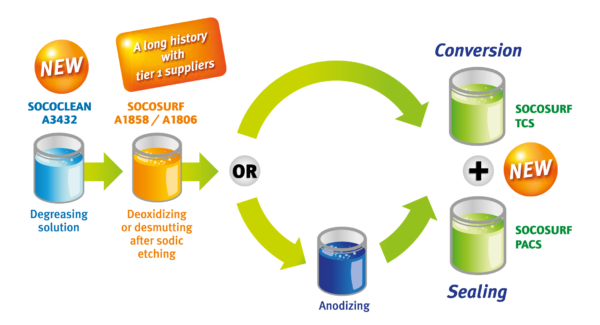With the REACh ban on hexavalent chromium, Cr(VI), due to take effect in 2024, OEMs need to plan ahead and ensure they have alternative, REACh compliant solutions in place for their aluminium surface treatment lines. That is why Liebherr-Aerospace and Collins Aerospace (formerly UTC Aerospace Systems) have evaluated and just approved SOCOSURF TCS / SOCOSURF PACS, a Cr(III) based solution for conversion and sealing after anodizing.
An alternative solution to CAA containing Cr(VI)
Hexavalent chromium is traditionally present in several stages of the aluminium surface treatment process including acid etching, chromic acid anodizing (CAA) and sealing. Due to the REACh ban on hexavalent chromium in 2024, a study was conducted by an industrial and university consortium (Mecaprotec, GIT, Ratier Figeac, Daher, Goodrich, Dassault Aviation, Liebherr, Cirimat) to find new CAA processes that do not contain hexavalent chromium, but do have thickness, fatigue and corrosion resistant properties equal to Cr(VI).
Results of the CAA Cr(VI) free study
Liebherr-Aerospace published the results of the study in “Traitements & Matériaux” in August-September 2018.
The goal of the study was to find a hexavalent chromium free anodizing solution that had the same main characteristics as Cr(VI):
500 hours corrosion resistance (Salt Spray Test) with a maximum of 5 pits per 1dm² of surface
thickness between 2 and 5μm
fatigue resistant performance superior or equal to CAA
Chromic acid anodizing (CAA) is an electrochemical process for the surface treatment of aluminium alloys. The aluminium part is placed in a chromic acid bath where an alumina layer forms on the surface. This layer is insulated and porous, limiting the corrosion resistant properties. That is why unpainted parts go for sealing after anodizing.
To replace the CAA process, the consortium first tried a sulfuric acid anodizing (SAA) bath with specific parameters to get a 2-5µm oxide layer. Next, they added nickel sulfate salts to impregnate and seal the pores of the oxide layer and increase the corrosion resistance.
Despite good corrosion resistant results, the consortium did not opt for this solution as nickel sulfate salts are hazardous.
A new process: impregnation and sealing
Another test was done based on a new impregnation and sealing process that was developed to protect aluminium alloys in aerospace. This process gave “very satisfying results”, according to Liebherr-Aerospace.
The new process is as follows:
- #1 – SAA to form a thin oxide layer
- #2 – Impregnation of the oxide layer pores
- #3 – Sealing of the porous layer
The first bath impregnates the pores of the oxide layer with Cr(III) and Zirconium. The second bath contains a corrosion inhibitor and acts as a post-treatment, sealing the pores to reinforce the corrosion resistance.
The most promising solution selected by the consortium was SOCOSURF TCS/PACS.
Compared to the traditional process, this new alternative solution provides very good corrosion protection, even if the first pits appear earlier. General corrosion resistance is obtained later than with the Cr(VI) process.


Liebherr qualifies SOCOSURF TCS / SOCOSURF PACS
LIEBHERR-AEROSPACE TOULOUSE has qualified SOCOSURF TCS / SOCOSURF PACS. The Cr(VI) free conversion and sealing solution can be used from now by LIEBHERR-AEROSPACE and its sub-contractors.
SOCOSURF TCS/ SOCOSURF PACS meets the following requirements:
- MFT 0538 Conversion of aluminum alloys
- MFT 0536 TFSAA sealing
Download the TDS here
Collins Aerospace (formerly UTC Aerospace Systems) qualifies SOCOSURF TCS / SOCOSURF PACS
Collins Aerospace (formerly UTC Aerospace Systems) has qualified the alternative solution to hexavalent chromium according to the following specification:
- LGPS 1109 Sealing after tartaric sulphuric acid (TSA) anodizing
Download the TDS here
A full range of REACh compliant aluminum surface treatment solutions


